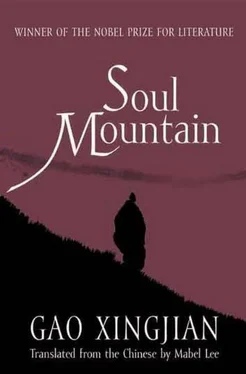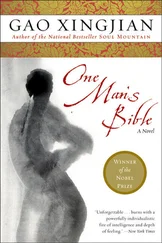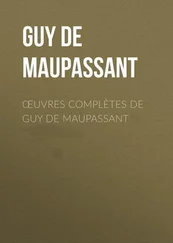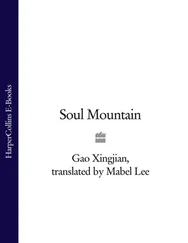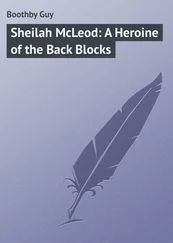She knew it would be like this, she sighs, her body going limp, as if she has no bones.
You want her to say she’s a fish!
No!
You want her to say she’s free.
Ah, no.
You want her to sink, you want her to forget everything.
She says she’s afraid.
You ask what she’s afraid of!
She says she doesn’t know, then says she’s afraid of darkness, afraid of sinking.
Flushed cheeks and leaping flames are suddenly swallowed in darkness, bodies are twisting and turning, she tells you not so rough, she calls out you’re hurting! She struggles, calls you an animal! She has been stalked, hunted, torn apart, devoured. Ah… this dense palpable darkness, primordial chaos, no sky no ground, no space, no time, no existence, no non-existence, no existence and no non-existence; non-existence exists so there is non-existence of existence; non-existence of existence exists so there is non-existence of non-existence; burning charcoal, moist eye, open cave, vapours rising, burning lips, deep growls; human and animal invoking primitive darkness; forest tiger in agony, lusting; flames rise, she screams and weeps; the animal bites, roars and, possessed by spirits, jumps and leaps, circling the fire which burns brighter and brighter, ephemeral flames, without form. In the mist-filled cave a fierce battle rages, pouncing, shrieking, jumping, howling, strangling and devouring… The stealer of fire escapes, the torch recedes into the distance, goes deeper into the darkness, grows smaller and smaller, until a flame no bigger than a bean sways in the cold breeze and finally goes out.
I’m terrified, she says.
What are you terrified of? you ask.
I’m not terrified of anything but I want to say that I’m terrified.
Silly child,
The other shore,
What are you saying?
You don’t understand,
Do you love me?
I don’t know,
Do you hate me?
I don’t know,
Haven’t you ever?
I only knew that sooner or later there would be this day,
Are you happy?
I’m yours, speak to me tenderly, tell me about the darkness,
Pangu wielded his great sky-cleaving axe,
Don’t talk about Pangu,
What shall I talk about?
Talk about the boat,
The boat was about to sink,
Was about to sink but didn’t,
Did it sink in the end?
I don’t know.
You’re really a child.
Tell me a story,
When the great flood broke out, only a small boat was left in the world, a brother and his younger sister were in the boat, they couldn’t bear the loneliness and huddled close together, only the flesh of the other was real, could verify one’s own existence,
You love me,
The girl was seduced by the snake,
The snake is my big brother.
I am taken by an Yi singer to several of the Yi camps in the mountain range behind Caohai. Further into the mountains, the hills are rounder and the forests more luxuriant. There is a primitive femininity about them.
The Yi women have dark skin, a high nose bridge and long eyes and they are very beautiful. They seldom look directly at a stranger and should they encounter one on a narrow mountain road, they keep their eyes down, say nothing, and stand aside to make way.
My singer guide sings many Yi songs for me. They all seem to be sad and tearful outpourings, even the love songs.
When the moon is out,
Don’t take a torch with you,
If you take a torch with you,
The moon will be heartbroken.
When vegetables are in flower,
Don’t take a basket to cut vegetables,
If you shoulder a basket to cut vegetables,
The vegetable flowers will be heartbroken.
If you are pledged to a girl who loves you,
Don’t fancy another,
If you fancy another,
The girl will be heartbroken.
He tells me that marriages are still fully arranged by parents among the Yi people. Young people who fall in love can only meet secretly in the mountains. If they are found out, the parents must bring them home. In the past they were put to death.
A pigeon and a chicken search for food together,
The chicken has an owner but the pigeon does not,
If the owner of the chicken takes the chicken home,
The pigeon is left all alone.
A girl and a boy play together,
The girl has an owner but the boy does not,
If the owner of the girl takes her home,
The boy is left all alone.
He can’t sing these love songs in front of his wife and children at home and comes to the hostel where I am staying in the county village. With the door of my room closed, he softly sings these in the Yi language and translates them for me.
He wears a long gown with a wide waistband and has a thin face and sad eyes. These are his translations of the songs into the Han-Chinese language and the sincerity of the words flow straight from his heart. He is a natural poet.
He says he’s old but there is little difference in our ages. He says he can’t hope to achieve anything for himself which I find surprising. He says he’s the father of two children, a twelve-year-old daughter and a seventeen-year-old son and that he has to work for his children. Later, I go to his home in the mountain stockade. The pig pen is connected to the main room and they keep two pigs. The open hearth is in the middle of the house and the bed in the inner room is covered with a grimy, thin, tattered and old cotton-wadding quilt. His wife has some illness so life for him is a heavy burden.
He also takes me to see a bimo , an Yi priest. We pass through several dark, narrow passageways and arrive at a small courtyard with a single gate and a single leaf door. He pushes open the gate, calls out and, when a loud male voice immediately answers, he opens the door and tells me to go in. A man in a long blue gown at the table near the window stands up. He is wearing a wide waistband and a black turban.
Speaking in the Yi language, he introduces me to the bimo , then tells me about him. The bimo is from a big clan in a place called Kele, high up in the mountains. He was brought down to perform ritual practices for the Yi people living in the county town. He is fifty-three. His eyes look unblinkingly at me. They are bright and clear but there is no communication. While fixed on me what they see is somewhere else, some other forest or a spiritual world.
I sit down at the table opposite the bimo and the singer explains why I have come. He is copying out an Yi scripture and is writing with a brush just like the Han Chinese. He nods after listening, wipes the brush in the ink box, puts the cap on the brush and covers the ink box. Then, placing squarely in front of him the book of brush-written text on yellowing fibre paper, he turns to the beginning of a chapter and suddenly begins to sing in a resounding voice. His voice is too loud for the small room. He starts on a high even pitch, then fluctuates between three to five on the scale, which instantly transports one to the flat embankments of the highlands. His voice must really carry a long distance.
Behind him, outside the window of this chilly room, the sunlight is bright and produces a glare on the dirt ground of the courtyard. A rooster cocks its head, as if listening attentively, but getting used to it is no longer startled and puts its head down to peck on the ground again. It seems that chanting scriptures should be like this.
I ask the singer what the priest is singing. He tells me it is a funeral dirge written in the ancient Yi language and he doesn’t understand it too well. I had asked him earlier about marriage and funeral practices, and especially if there would be an opportunity for me to see a funeral such as he had described, as nowadays to see the splendour of such an event is quite difficult. The sustained rising and falling crescendo of the high pitched singing of the bimo rises from the throat, hits the back palate, passes through the nasal cavity causing it to resonate, and then charges out through his forehead. His qi energy is fully developed but is showing signs of aging. Listening to him sing, I seem to see the crowds of a funeral procession: people beating gongs and drums, blowing the suona , carrying flags on poles, paper people, and paper horses. The women are riding on horses and the men have rifles which they fire along the way.
Читать дальше
Конец ознакомительного отрывка
Купить книгу
